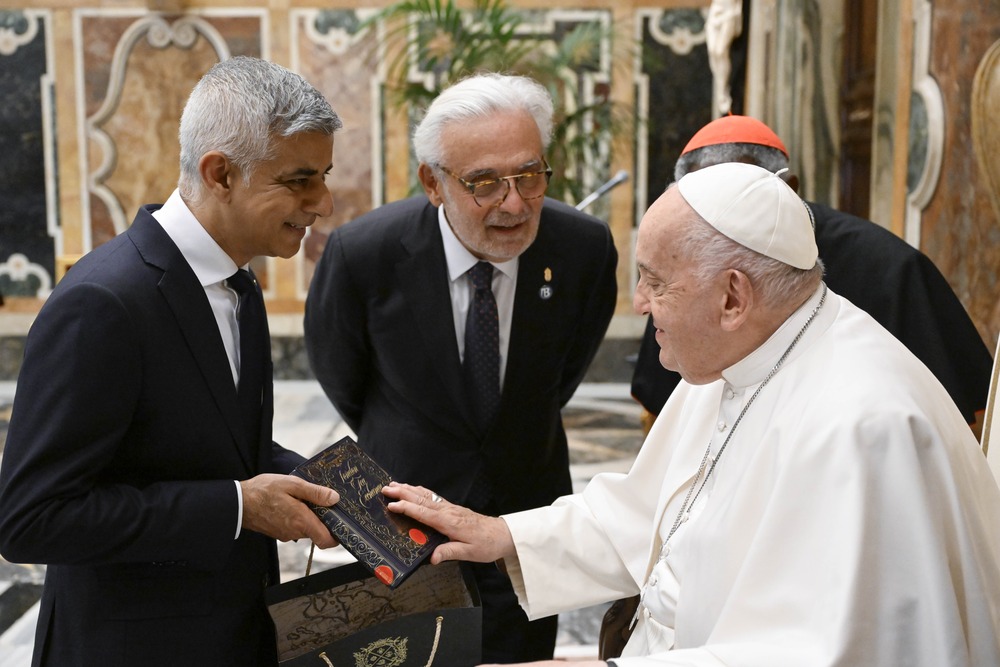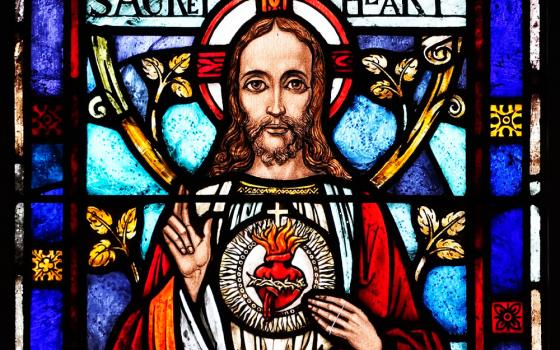
Pope Francis greets London Mayor Sadiq Khan, left, after an audience in the Apostolic Palace at the Vatican May 16, 2024, with participants in a conference on climate resilience sponsored by the Pontifical Academy of Sciences and the Pontifical Academy of Social Sciences. (CNS/Vatican Media)
Pope Francis urged three U.S. governors and a group of mayors from around the world to work with international partners in developing a "holistic" approach to climate action that reduces emissions and combats inequality.
"The refusal to act quickly to protect the most vulnerable who are exposed to climate change caused by human activity is a serious offense," the pope told scholars and government leaders gathered at the Vatican May 16. "The climate crisis requires a symphony of cooperation and global solidarity," which includes "emissions reduction, lifestyle education, innovative financing, and the use of proven nature-based solutions."
Eight governors from around the world, including the governors of California, New York and Massachusetts, and 16 mayors from international cities met the pope during a three-day Vatican summit on climate resiliency.
Francis told them that unless issues such as the loss of biodiversity, global disparities and lack of food security are faced "urgently and collectively," they will "represent existential threats for our human family, for other living beings and for ecosystems."
The pope stressed the disproportionate impact climate change has on the world's poor people, who due to pollution are put out of work, forced to migrate and are put at greater risk of health issues. He called for a worldwide end of dependence on fossil fuels, the protection of natural territories such as the Amazon and Congo basins and the restructuring and reduction of debt held by countries in the global South to acknowledge the "ecological debt" owed to them.
Speaking with Catholic News Service after the meeting with the pope, California Gov. Gavin Newsom said that moral voices on climate change, like that of Pope Francis, are essential.
Fighting climate change "is not an intellectual exercise," he said, so discussing the climate crisis in terms of morality brings "a deeper, more human way to the fore."
Advertisement
But only speaking about climate action from a moral perspective is not enough, he said. "As we know from church it's faith and works, so as we pray, we move our feet," he said, stressing the role of faith in fostering the belief that effective climate action is possible and to not "fall prey to cynicism and negativity."
In his address to scholars and government leaders on the summit's second day, Newsom said that "localism is determinative" in combatting climate change, noting that when "we think about climate, we think about greenhouse gas emissions; it's the sum total of all those emissions that happen on a local basis that we need to confront."
New York Gov. Kathy Hochul also addressed the conference, telling participants that in implementing climate action, local government leaders must ask themselves, "Is there justice for all?"
"Sadly the answer is not yet. We're on a quest, and that is what the Holy Father put us on a quest to do this morning," she said.
While many people can feel "overwhelmed and defeated" by the climate crisis, Hochul said leaders should listen to the message of Francis, "who joined our responsibility to earth (to) taking care of the poor — they are one and the same."
And, she added, while governments need "the vision to lead the way forward" on climate action, "you better put money behind it, or it's just talk."
Joining the mayors from Paris, London and São Paulo, among others, was Boston Mayor Michelle Wu. She told CNS that collective climate action must be taken by city leaders since most of the world's population lives in cities and cities are also the source of most global emissions.
Wu said that Francis' moral leadership is "needed right now to drive the urgency and collective action" needed to combat climate change, and she highlighted that in her own community the Archdiocese of Boston is "walking the walk" of decarbonization in their properties and living in service of "those who are most in need and often disproportionately bearing the impact of climate change."








